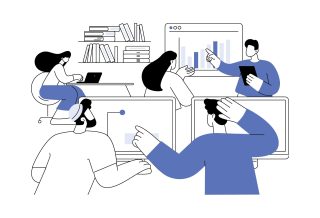FOCUS
Technology moves from resource to lifeline
By Suzanne Bouffard
Categories: Online learning, Reaching all students, TechnologyAugust 2020
Vol. 41, No. 4
When we started planning this issue on technology in 2019, none of us could have predicted how important technology would become in our schools and our lives. Tools that once seemed like a helpful supplemental resource have become a lifeline.
As we start a new school year, the potential and pitfalls of technology are on every educator’s and parent’s mind. No matter what teaching approaches we take — remote, hybrid, in-person — access to and facility with technology will play a huge role in how, and how much, students learn.
No matter what teaching approaches we take — remote, hybrid, in-person — access to and facility with technology will play a huge role in how, and how much, students learn. Share on XChildren and adolescents aren’t the only ones learning through technology, of course. Educator professional learning has largely shifted online, too. Every day, educators are using videoconferencing and webinars to gather information from colleagues, engaging in online tutorials to learn new content and skills, and using collaborative software and apps to work together.
The pandemic has sped up tech-based efforts already underway to increase the breadth, depth, and accessibility of professional learning. It has also inspired new, innovative approaches to meet the demands of the harrowing moment we are in.
This issue of The Learning Professional brings you information, tools, and resources from both of those intersecting trends. In the Focus section, professional learning leaders share what they are learning about educators’ emerging needs and how technology helps meet them. They also offer advice on how to make the most of online learning when it can’t be supplemented by in-person learning.
In the Ideas section, you’ll find insights and analysis about the ongoing development of tech-supported approaches to coaching, mentoring, and other forms of professional support. Growing research on the benefits of these methods could not come at a better time.
This issue also includes a tool to help you plan video observations of remote teaching and learning. It is designed with a focus on new-teacher mentors but can be useful to any learning professional aiming to support others.
To realize the full potential of these tools and approaches, we must attend to urgent issues of equity. Equity is about far more than ensuring that everyone has access to a computer and high-speed internet (although that remains an essential and unmet need in many communities). Undoing the systemic inequity and racial bias in our schools will take self-reflection, difficult conversations, and deep changes in practice and policy.
See Learning Forward’s pledge to fight racism and support demands for justice for Black and brown people. Learning Forward president and CEO Denise Glyn Borders expounds on the need for this work and the role that professional learning can play. We urge you to keep equity front and center, whether you’re planning video observations, preparing for blended learning, analyzing research, or coaching for growth mindset.
We’ve faced enormous challenges and navigated multiple crises over the past few months. Although we’ve been on a steep learning curve, learning professionals are leaping out of their comfort zones to build skills none of us expected to need.
We’re inspired by educators reaching out to share their knowledge, offering resources and support, and finding expertise in new places and new people. Our collective knowledge is far greater than it was when the pandemic began, yet there is still so much to learn.
The pandemic has sped up tech-based efforts already underway to increase the breadth, depth, and accessibility of professional learning.
Download PDF here.

Suzanne Bouffard is senior vice president of communications and publications at Learning Forward. She is the editor of The Learning Professional, Learning Forward’s flagship publication. She also contributes to the Learning Forward blog and webinars. With a background in child development, she has a passion for making research and best practices accessible to educators, policymakers, and families. She has written for many national publications including The New York Times and the Atlantic, and previously worked as a writer and researcher at the Harvard Graduate School of Education. She has a Ph.D. in developmental psychology from Duke University and a B.A. from Wesleyan University. She loves working with authors to help them develop their ideas and voices for publication.
Categories: Online learning, Reaching all students, Technology
Recent Issues
LEARNING DESIGNS
February 2025
How we learn influences what we learn. This issue shares essential...
BUILDING BRIDGES
December 2024
Students benefit when educators bridge the continuum of professional...
CURRICULUM-BASED PROFESSIONAL LEARNING
October 2024
High-quality curriculum requires skilled educators to put it into...
LEARNING TO PIVOT
August 2024
Sometimes new information and situations call for major change. This issue...












